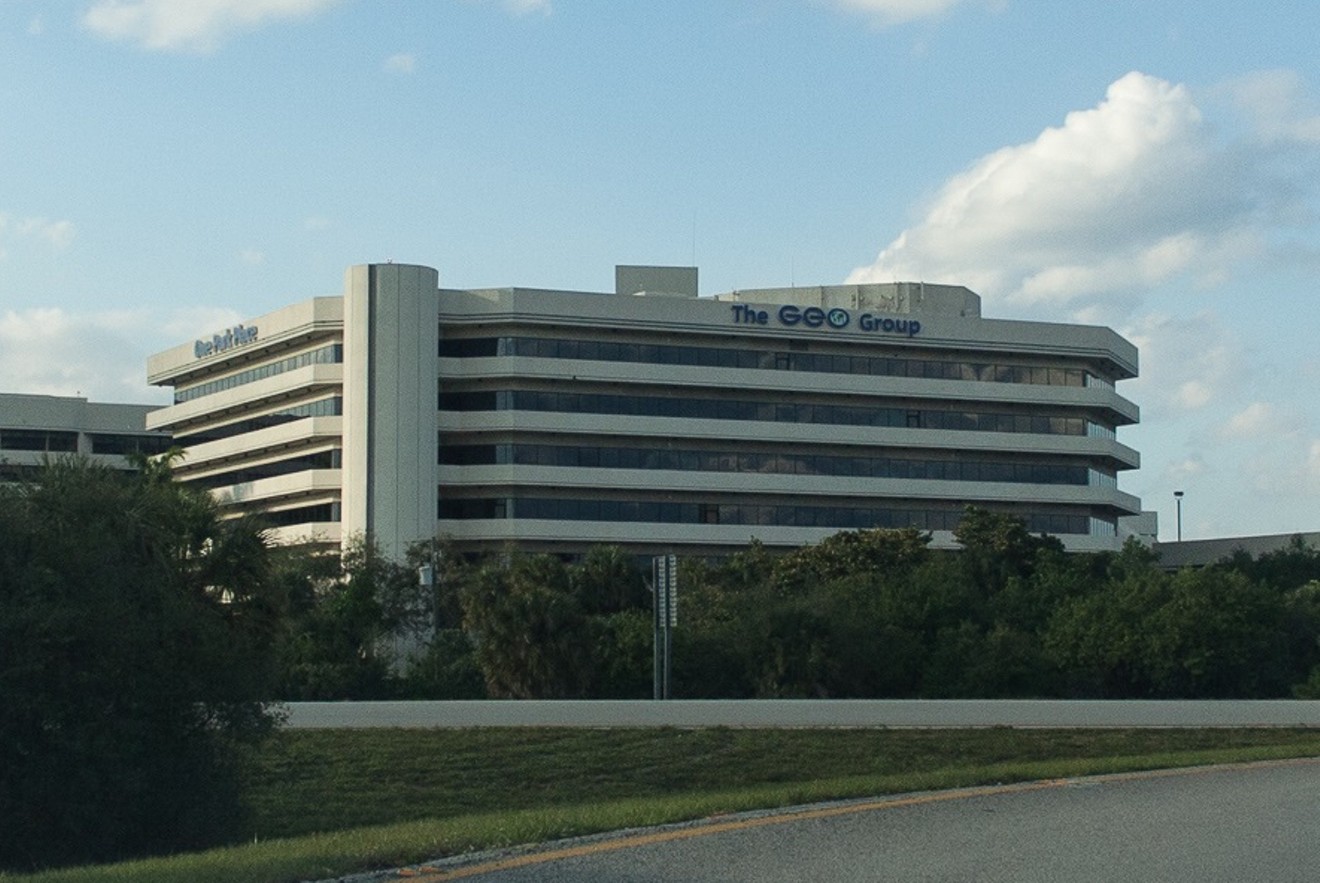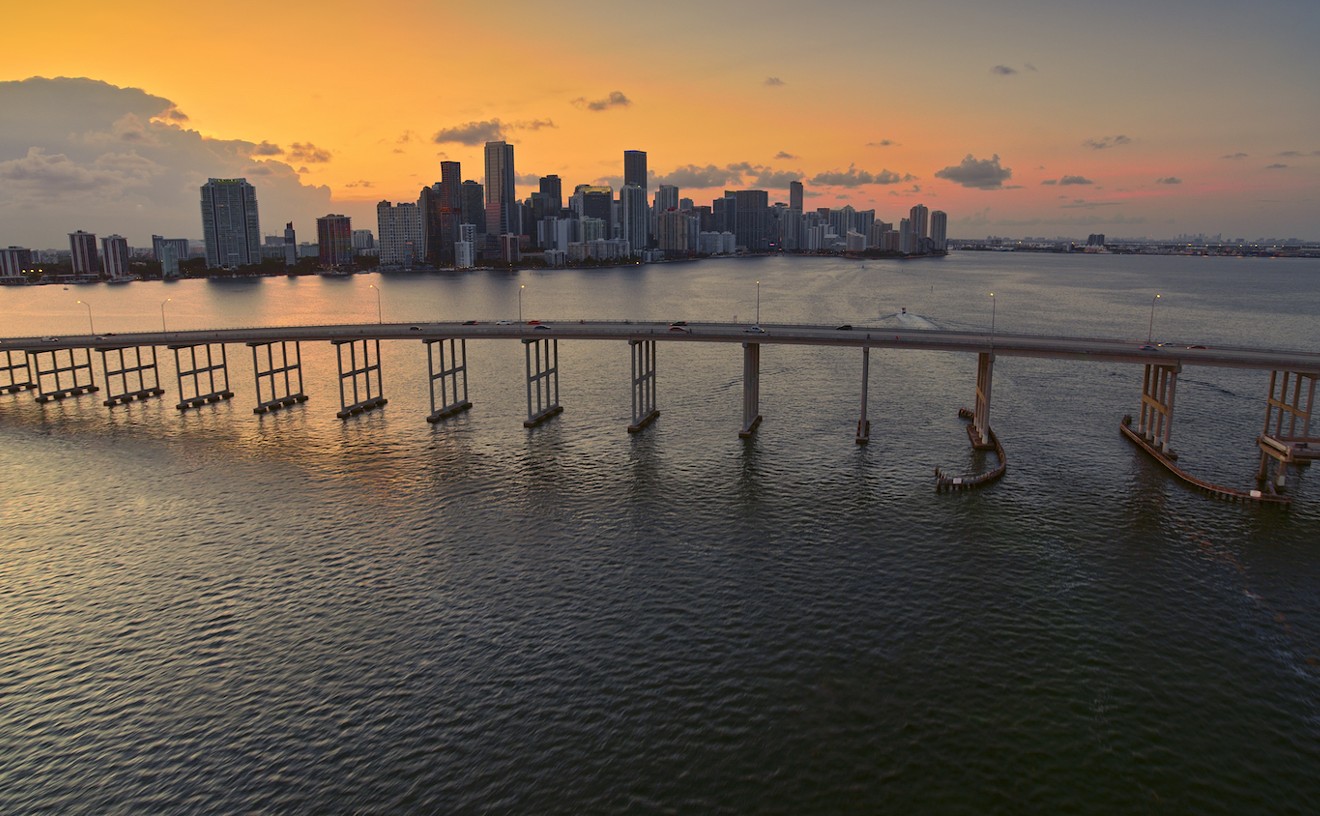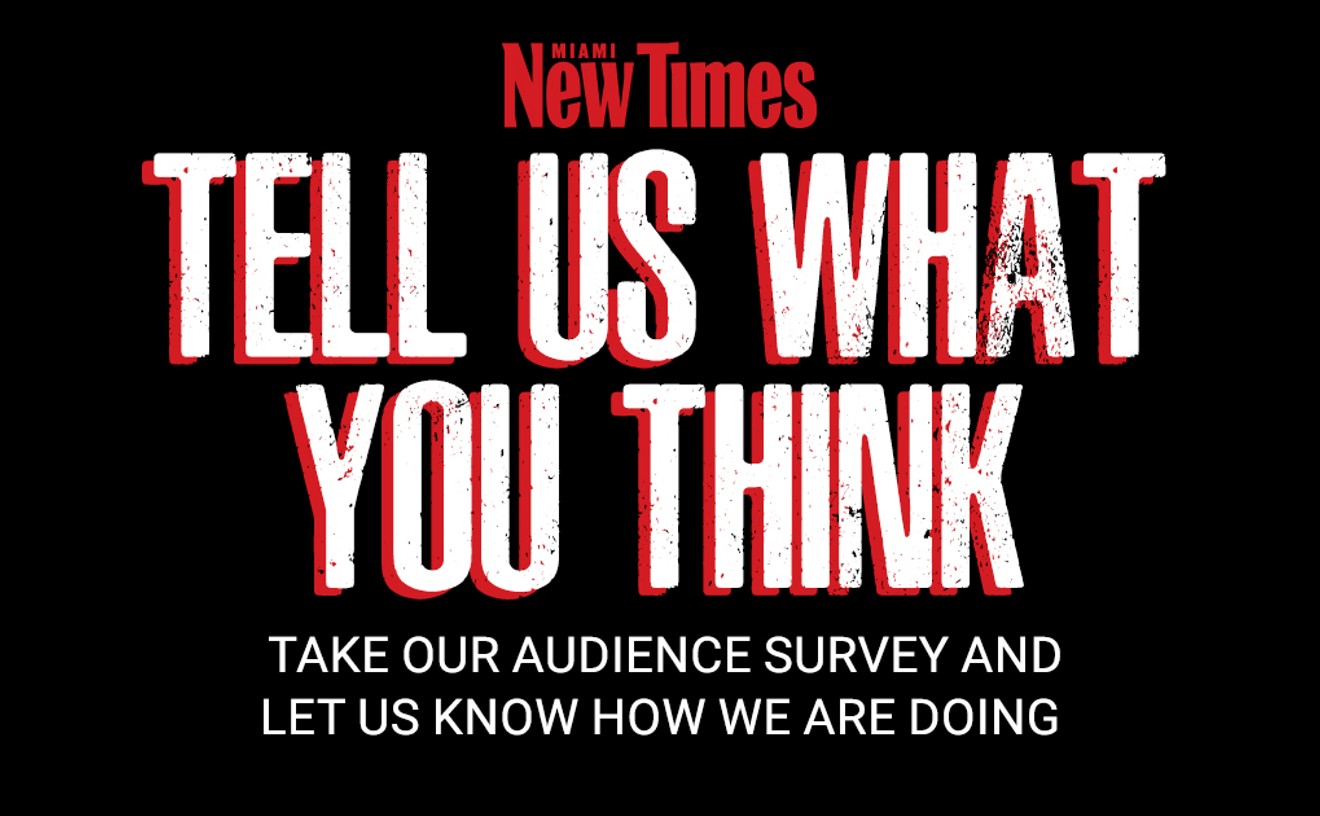Most South Floridians likely aren't aware that one of the two largest private-prison corporations in America, the GEO Group, is headquartered in Boca Raton. GEO is one of the most powerful political donors in Florida — the company donates heavily to candidates such as Sens. Marco Rubio and Bill Nelson, as well as Reps. Carlos Curbelo and Mario Diaz-Balart. GEO also vomited money at the Trump campaign in 2016 — leading some to question whether Attorney General Jeff Sessions announced this week that he's cracking down on marijuana users in order to help fill GEO's cells.
But New Times has been on GEO's case for years. How awful is this company? Let us count the ways:
1. It's been sued multiple times for allegedly forcing detainees to work for food.
Boca Raton's GEO Group is the second-largest private-prison company in America and makes a huge portion of its income imprisoning people on behalf of U.S. Immigration and Customs Enforcement (ICE). It has repeatedly denied inmates in its facilities are forced to work against their will. The company rejected those claims in 2014, when a group of former detainees from Colorado filed a lawsuit alleging GEO forced them to work. The company refuted those claims again when the Washington state attorney general sued the company this past September.2. A GEO facility outside Los Angeles was named the "deadliest ICE detention center" of 2017.
Last week, California inmate Raul Novoa filed a legal complaint against the South Florida company, alleging that he and other inmates were forced to labor inside a GEO facility and that the company "maintains a corporate policy and uniform practice" of forcing inmates to work for $1 per day, which they need to buy basic necessities such as "food, water, and hygiene products."
Novoa's suit, which was first reported by Law360, also contends GEO punishes detainees who refuse to work by throwing them into "disciplinary segregation or solitary confinement," reporting them to ICE, or "referring them for criminal prosecution."
GEO has long been criticized around the world for alleged human-rights abuses, terrible medical care, and deaths at its facilities. Last year, for example, the Detention Watch Network, a nonprofit that tracks prison and detainee abuse, released the following after ICE detainee Vicente Caceres-Maradiaga, 46, died in GEO care:
The Adelanto detention center where Caceres-Maradiaga died is operated by The GEO Group Inc., a notorious private prison company that has a well-documented track record of abuse, mismanagement and neglect. The passing of Caceres-Maradiaga brings ICE’s total death count to 173 since 2003 — a shameful record further exposing ICE’s inability to guarantee the safety and health of people in its custody. Recent investigations into deaths in immigration detention have found that inadequate medical care at detention centers has contributed to numerous deaths.3. The American Civil Liberties Union accused GEO last year of torturing detainees in Arizona.
“We are outraged by the disregard for human life and ICE’s ongoing refusal to meet demands for transparency,” said Danny Cendejas, organizing director at Detention Watch Network. “We cannot allow the loss of life in immigration detention to become routine and desensitized — ICE must be held accountable for the rising death toll.”
A federal investigation into Adelanto’s first death concluded that the death of Fernando Dominguez could have been prevented. CIVIC and Human Rights Watch recently analyzed the medical records of Raul Ernesto Morales-Ramos, a man who died in 2015 at Adelanto, concluding that subpar medical care contributed to his death.
“Adelanto is notorious for its substandard medical care. A government investigation in 2015 forced GEO Group to turn over its medical unit to Correct Care Solutions (CCS), but nothing has improved. In fact, CCS’s CEO is a former VP at GEO Group. If the federal government is unwilling to shut down Adelanto, it is time for California to cut ties with private immigration detention facilities by passing the Dignity Not Detention Act,” said Christina Fialho, a California-based attorney and co-executive director of CIVIC.
Boca Raton's GEO Group is one of the most powerful private-prison companies in America — and a major player in state and federal politics. GEO throws campaign money at Florida lawmakers from both parties: Sens. Marco Rubio and Bill Nelson, Gov. Rick Scott, Reps. Carlos Curbelo and Mario Diaz-Balart, and the majority of the Florida Legislature have taken thousands from GEO despite constant complaints from progressives and human-rights activists who say the company profits from destroying the lives of others.4. The company has been criticized multiple times for nickel-and-diming prisoners for necessary services and misspending federal money.
Well, here's yet another reason Florida politicians should drop GEO Group like the plague: The American Civil Liberties Union said Friday that the company is torturing whistleblowers at its private immigration detention facility in Aurora, Colorado. GEO runs the facility on behalf of U.S. Immigration and Customs Enforcement.
According to the ACLU, ICE agents at GEO's 1,500-bed Colorado detention center are retaliating against Iraqi nationals who have joined an ACLU class-action lawsuit to stop the U.S. from deporting them. The ACLU says employees at the GEO facility are denying Iraqis food, water, and access to the restroom to intentionally make their lives a living hell.
"GEO, the second largest immigration detention facility in the country, is a tightly regulated, colorless institution with bare cement walls, large metal doors that lock at every threshold, and scores of prisoners in scrubs," the ACLU writes. "Each of the detainees we interviewed provided accounts of mistreatment. These accounts were consistent, as was their palpable fear of death if ultimately deported to Iraq."
Local activists last week protested Boca Raton-based GEO Group for abuses in the highly profitable private prisons it runs. Meanwhile, the company is under scrutiny by the Department of Justice for wasting at least $3 million while operating a troubled rural Texas prison that has seen riots and death in the past few years. An audit says GEO Group has understaffed the facility and mistreated inmates, all of whom are immigrants.5. It propped up the Trump campaign with donations that were likely illegal.
The DOJ’s Office of Inspector General audited the private prison behemoth’s Reeves County Detention Center outside of Pecos, Texas and recently released the findings. The contract under review is worth $493 million over ten years — the second-largest private contract awarded by the Bureau of Prisons. The contract was actually awarded to the governmental body of Reeves County, which then hired GEO Group to run the prison and Correct Care Solutions, based in Tennessee, to handle health-care services.
“We identified almost $3 million that we either questioned as unallowable or unsupported, or believe should be put to better use,” the IOG says in its report.
Of that $3 million, $1.95 million was spent on fringe benefits that GEO employees were not supposed to receive, which ranged from payroll bonuses to miscalculated workers’ compensation. There were also underpayments to 12 employees.
Per Mother Jones, the nonprofit Campaign Legal Center is suing the Federal Election Commission for allowing GEO to illegally donate $250,000 to a pro-Trump political action committee in 2016 despite clear rules stating federal contractors are not allowed to make political contributions:
It’s no secret that President Donald Trump has been very good for private prison executives. After the Justice Department announced earlier this year that it would continue using private lockups—a reversal of an Obama policy announced in 2016—prison companies’ stock prices soared. Now, a campaign finance watchdog is suing to figure out whether one of these prison companies influenced the Trump administration’s policy reversal by donating large sums to a pro-Trump super-PAC during the 2016 presidential campaign.
In August and November, GEO Group, the country’s biggest private prison company, donated a total of $225,000 through a subsidiary to a pro-Trump super-PAC, according to campaign disclosures. The super-PAC, Rebuilding America Now, had been heartily endorsed by the Trump team; Mike Pence said contributions to the group would be “one of the best ways to stop Hillary Clinton and help elect Donald Trump our next president.” But according to a lawsuit filed Thursday by the Campaign Legal Center, the prison company’s decision to fund the super-PAC allegedly violated federal law, which prohibits government contractors from making political contributions.
GEO Corrections Holdings made a donation of $100,000 on August 19, just one day after the Obama administration announced that it would phase out its use of private prisons because of their high rates of violence. In November, before Election Day, the GEO subsidiary made another donation to Rebuilding America Now.












